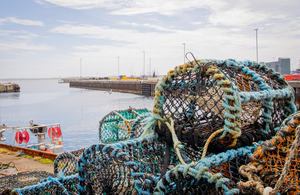Major changes coming for the £1bn Scottish seafood exporting industry
Scotland’s £1 billion fishing and seafood sector will need to adapt to new EU changes in the information and data they submit to enable their exports to flow smoothly from the UK.

Peterhead
In Scotland the fish and seafood sector remains a cornerstone of the national economy and lifeline for many coastal and island communities. With seafood exports, accounting for 70% of Scotland’s total seafood industry, the Marine Management Organisation (MMO) is working with the Scottish government and urging Scottish businesses to act now to prepare for new EU import rules around traceability coming into force on 10 January 2026.
The upcoming changes will affect every link in the supply chain, from fishers and merchants to processors and exporters All UK devolved administrations are working in partnership and have launched the new #FishTraceShip campaign to help industry prepare.
Robert Watson, Operational Lead (onshore), Marine Directorate, Scottish Government, said:
Scotland’s seafood sector supports thousands of jobs and communities across our coasts. These new requirements, introduced by the EU, represent a significant change for businesses.
We’re urging Scottish processors and exporters to act now, understanding the new EU rules and using our support tools will be key to meeting the new requirements. The Fish, Trace, Ship campaign is here to help the industry meet these obligations and maintain Scotland’s reputation for quality and traceability.
UK Government is updating the Fish Export Service (FES) to ensure the IT system can provide the catch certificates, processing statements and non-manipulation documents required by the EU from 10 January 2026, providing each sector in the supply chain delivers the correct information on time.
The changes mean that processing statements must be provided for all:
-
Goods caught and landed by a UK vessel
-
Then processed in the UK before export
The definition of processing has been expanded to mean any seafood that has been cut, filleted, canned, smoked, salted, cooked, pickled, dried, or otherwise prepared for market. Fish which has only been frozen and/or packed will not require a processing statement.
Processing statements will also need to show the weights of each type of seafood that has contributed to each processed product.
Nick Greenwood, MMO’s Head of Marine Protection and Operations Services, said:
Scotland’s seafood industry plays a vital role in both the UK and Scottish economy and the livelihoods of thousands of people in coastal communities. These changes will affect many businesses that haven’t previously needed to supply processing statements.
We’re urging Scottish processors and exporters to act now, understanding the new requirements and engaging with our support tools will be key to a smooth transition.
Our message is that you need to make sure you know whether this affects your business right now and take action if it does.
The UK Government has already launched the first in a series of webinars and engagement events to support the UK seafood industry to prepare for significant changes to EU import requirements early next year The next sessions will be on December 10 and 17 and anyone impacted by the changes can register to attend.
To stay up to date with the new changes, sign up for our Fish, Trace, Ship newsletter .